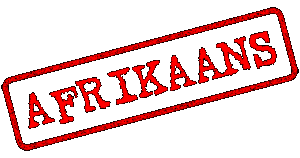Okay well. Where the hell do I start?
1) a 'J' is pronounced as a 'Y'. Julle is pronounced Yuh-lla
which brings us to
2) generally an 'E' on the end of a word is pronounced as an 'A'. Hulle is said Huh-lla
3) 'Y' is pronounced 'AY'. Yskas is pronounced Ays-kus
4) 'A' is pronounced 'U'. Kat is said Kut
5) when writing an address, the number comes second so instead of 100 Prospect Hallweg, it'd be written Prospect Hallweg 100
6) a 'W' is said as a 'V'. Weg is said Veg
a 'V' is said as an 'F'. Vrugte is said frugte
7) a 'G' is said the same way a CH is said in German.
8) you rrroll your RRRRs.
9) You dont go 'op vakansie' (on holiday); you go 'met vakansie' (with holiday) (grammatical and slightly too complicated to explain)
and
10) there are no Cs, Xs, Qs or Zs in Afrikaans (unless the word is taken from another language eg. Pizza/Ricotta etc)
Hope ive covered everything...
OH and also, a deelteken (double dots on an E) does sometimes change the meaning of a word. Hoër means high/higher (depending on context of sentence) but Hoer means prostitute. WHOOPS mistake you dont want to make.
It also changes how you say a word. Take Voël. Without the deelteken you'd say that 'fool' but with the deelteken, you say it 'foo-ill'
Same with reën. Without the deelteken, you'd say 'reen' but with it, you say 'ree-in'
And a kappie also changes how you say something. Like se and sê. Se you say like 's-ah' but sê you say 's-ehh'
 |
| Kappie |
 |
| Deelteken |
And also, if there's an accent on a letter or a word é, á, ó like such, it means you emphasise that word. Like if a word is written in italics in English
He was such a naughty boy
Hy was 'n báíé stout seun
Hope that makes sense xD

hoer-whore
ReplyDeleteprostitute is not the same
what evs.. Still the same idea generally
ReplyDelete